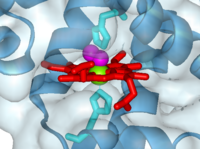We apologize for Proteopedia being slow to respond. For the past two years, a new implementation of Proteopedia has been being built. Soon, it will replace this 18-year old system. All existing content will be moved to the new system at a date that will be announced here.
User:Michael Roberts/BIOL115 Myo
From Proteopedia
(Difference between revisions)
m |
|||
| Line 47: | Line 47: | ||
'''OXYGEN''': | '''OXYGEN''': | ||
The space between the iron and the distal histidine is where the <scene name='User:Michael_Roberts/BIOL115_Myo/Heme/6'>oxygen</scene> (pink) binds. | The space between the iron and the distal histidine is where the <scene name='User:Michael_Roberts/BIOL115_Myo/Heme/6'>oxygen</scene> (pink) binds. | ||
| - | Note the angled orientation of the oxygen relative to the plane of the heam. The natural binding of oxygen to heam in solution would be the | + | Note the angled orientation of the oxygen relative to the plane of the heam. The natural binding of oxygen to heam in solution would be the O<sub>2</sub> molecule perpendicular to the plane. In myoglobin (and haemoglobin) the presence of the distal His forces to O<sub>2</sub> to one side, reducing the affinity of the heam-O<sub>2</sub> binding, thus allowing release of oxygen when pO<sub>2</sub> is low. The same effect of the distal His also reduces the affinity of heam for carbon monoxide. |
</StructureSection> | </StructureSection> | ||
Revision as of 12:22, 27 April 2015

Myoglobin with oxygen bound to heme (1a6m)
The heme group and oxygen binding in myoglobin.
Myoglobin is a protein whose function is to store oxygen in muscle tissues. Like heamoglobin, it is red in colour, and it is myoglobin that gives muscle its strong red colour.
Myoglobin was the first globular protein for which the 3-dimensional structure was solved, back in the late 1950s. It gives its name to the 'globin fold', a common alpha domain motif. An alpha domain is a structural region composed entirley of alpha-helix.
Click on the 'green links' in the text in the scrollable section below to examine this molecule in more detail.
| |||||||||||
